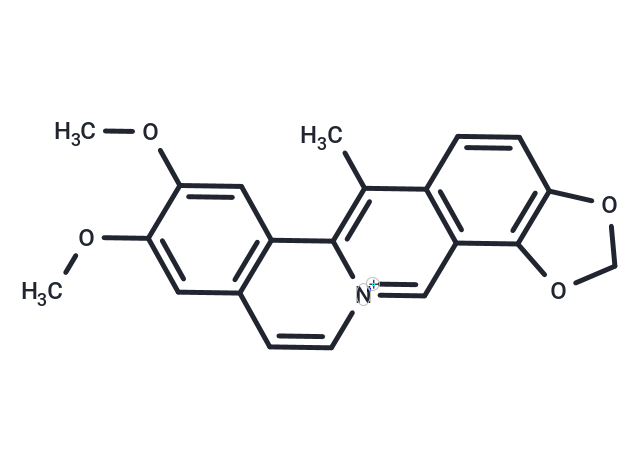 Your shopping cart is currently empty
Your shopping cart is currently empty

Dehydrocavidine (Dehydrocorydaline) has antitumor activity, it inhibits MCF-7 cell proliferation by inducing apoptosis mediated by regulating Bax/Bcl-2, activating caspases as well as cleaving PARP.

| Pack Size | Price | USA Warehouse | Global Warehouse | Quantity |
|---|---|---|---|---|
| 1 mg | $207 | 7-10 days | 7-10 days | |
| 5 mg | $465 | 7-10 days | 7-10 days | |
| 10 mg | $698 | 7-10 days | 7-10 days | |
| 25 mg | $1,255 | 7-10 days | 7-10 days | |
| 50 mg | $1,890 | 7-10 days | 7-10 days |
| Description | Dehydrocavidine (Dehydrocorydaline) has antitumor activity, it inhibits MCF-7 cell proliferation by inducing apoptosis mediated by regulating Bax/Bcl-2, activating caspases as well as cleaving PARP. |
| In vitro | The complexation behavior of palmatine (P) and Dehydrocorydaline (DHC) alkaloid guest molecules by cucurbit[7]uril (CB7) host have been investigated by means of fluorescence spectra in aqueous phosphate buffer solution (pH 7.2). It is found that each alkaloid exhibits dramatic fluorescence enhancement upon complexation with CB7, and the intensity of the emittance is strong enough to be readily distinguished by the naked eye. Although the two guests possess similar structure, the complex stability constant of P with CB7 is 5.4 times larger than that of DHC. |
| Synonyms | Dehydrocorydaline |
| Molecular Weight | 348.37 |
| Formula | C21H18NO4 |
| Cas No. | 83218-34-2 |
| Smiles | COC1=CC(C2=C(C)C(C=CC3=C4OCO3)=C4C=[N+]2C=C5)=C5C=C1OC |
| Relative Density. | no data available |
| Storage | Powder: -20°C for 3 years | In solvent: -80°C for 1 year | Shipping with blue ice/Shipping at ambient temperature. |
Dissolve 2 mg of the compound in 100 μL DMSO![]() to obtain a stock solution at a concentration of 20 mg/mL . If the required concentration exceeds the compound's known solubility, please contact us for technical support before proceeding.
to obtain a stock solution at a concentration of 20 mg/mL . If the required concentration exceeds the compound's known solubility, please contact us for technical support before proceeding.
1) Add 100 μL of the DMSO![]() stock solution to 400 μL PEG300
stock solution to 400 μL PEG300![]() and mix thoroughly until the solution becomes clear.
and mix thoroughly until the solution becomes clear.
2) Add 50 μL Tween 80 and mix well until fully clarified.
3) Add 450 μL Saline,PBS or ddH2O![]() and mix thoroughly until a homogeneous solution is obtained.
and mix thoroughly until a homogeneous solution is obtained.
| Size | Quantity | Unit Price | Amount | Operation |
|---|

Copyright © 2015-2026 TargetMol Chemicals Inc. All Rights Reserved.